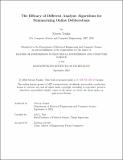| dc.contributor.advisor | Tsai, Lily L. | |
| dc.contributor.author | Venkat, Naveen | |
| dc.date.accessioned | 2024-10-09T18:25:50Z | |
| dc.date.available | 2024-10-09T18:25:50Z | |
| dc.date.issued | 2024-09 | |
| dc.date.submitted | 2024-10-07T14:34:21.484Z | |
| dc.identifier.uri | https://hdl.handle.net/1721.1/157168 | |
| dc.description.abstract | For the past decade, online deliberation platforms like Polis have expanded the reach of deliberative democracy, which calls for political decisions to be based on the results of fair and balanced discussions among citizens, by enabling larger deliberations. However, as these discussions often generate a large volume of comments, which is infeasible for policymakers to thoroughly review, these platforms often include analysis algorithms that distill the conversation into a small set of comments, which policy-makers can use as the base of citizen input into decision-making. While Polis currently provides a clustering-analysis summary of the discussion, two newer aggregation algorithms, inspired by computational social choice theory and abstract argumentation theory, have recently been proposed. These algorithms seek to provide more representative (i.e. portraying all perspectives) and consistent (i.e. comments within a perspective do not oppose each other) summaries of the discussion, respectively. Still, though these newer algorithms may have theoretical advantages over Polis’s current methods, they have yet to be evaluated in a real-world application. Through a randomized controlled trial of all three approaches using a nationally representative sample, we compare their practical effectiveness, as measured by participants’ subjective experiences regarding how well these summaries represent their concerns. We find that the computational social choice-inspired algorithm consistently outperforms Polis’s current methods in this regard, though future theoretical work is still needed to fully adapt this approach to a real-world setting. | |
| dc.publisher | Massachusetts Institute of Technology | |
| dc.rights | Attribution-NonCommercial-NoDerivatives 4.0 International (CC BY-NC-ND 4.0) | |
| dc.rights | Copyright retained by author(s) | |
| dc.rights.uri | https://creativecommons.org/licenses/by-nc-nd/4.0/ | |
| dc.title | The Efficacy of Different Analysis Algorithms for Summarizing Online Deliberations | |
| dc.type | Thesis | |
| dc.description.degree | M.Eng. | |
| dc.contributor.department | Massachusetts Institute of Technology. Department of Electrical Engineering and Computer Science | |
| dc.identifier.orcid | https://orcid.org/0000-0002-3742-9586 | |
| mit.thesis.degree | Master | |
| thesis.degree.name | Master of Engineering in Electrical Engineering and Computer Science | |
